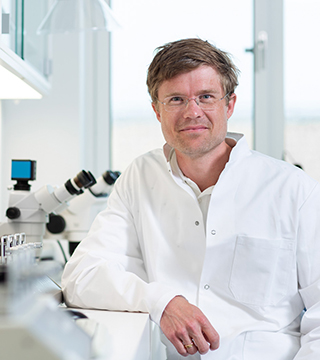Ebbe Bødtkjer

“Currently we develop pharmacological tools that target acid-base transporters and are promising as future anti-cancer therapeutics.”
Metabolic manipulation – for the benefit of stroke and cancer
How do acid-base derangements and metabolic disturbances influence cell functions? Could we manipulate these mechanisms for the benefit of patients suffering from stroke, myocardial infarction and cancer? Those are fundamental questions for professor Ebbe Bødtkjer, born 1982, who is a researcher in the field of metabolic activity.
Cardiovascular disease and cancer account for approximately half of all deaths in the Western world. Both disease groups are characterised by mismatch between the metabolic demand and the delivery of oxygen and nutrients – and it has fascinated Ebbe Bødtkjer for a number of years.
“I currently explore influences of local metabolic and acid-base disturbances on cell and tissue function,” says Ebbe Bødtkjer, who is intrigued by the body’s ability to adapt to a broad spectrum of physiological conditions and disease states all characterised by enormous variation in metabolic activity.
In the area of cardiovascular disease, Ebbe Bødtkjer investigates novel molecular mechanisms that influence blood flow in tissues with unmet metabolic demand – such as in stroke and myocardial infarction, where the blood supply cannot cover the oxygen requirement. In the field of cancer, the research deals with the role of acid-base transporters and sensors that are involved in cancer cell adaptations to the acidic tumor microenvironment.
“Here we found that genetic disruption of specific acid-base transporters delays breast cancer development and decelerates tumor growth. Currently we develop pharmacological tools that target acid-base transporters and are promising as future anti-cancer therapeutics,” says Ebbe Bødtkjer – emphasizing that the part of science, he enjoys the most is the first look at new data that indicates a new understanding of a hitherto unanswered question.
Ebbe Bødtkjer has received considerable encouragements at different stages of his career path: An Eliteforsk Travel Stipend, a Sapere Aude: Research Talent grant and a Sapere Aude: Research Leader grant.

“Currently we develop pharmacological tools that target acid-base transporters and are promising as future anti-cancer therapeutics.”